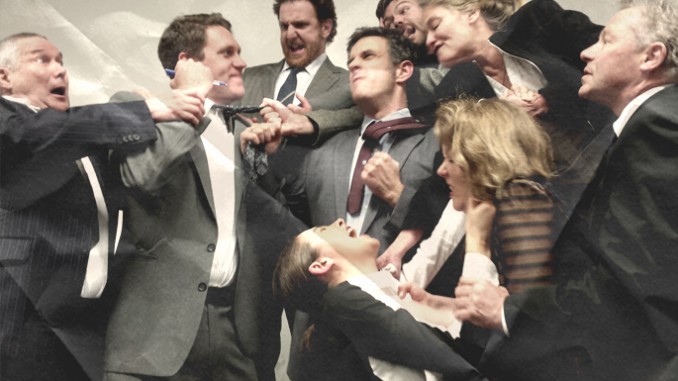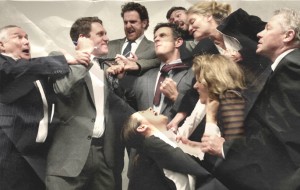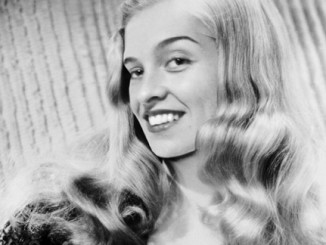
Political Swarm from Elections Past [by James Wenley]

It’s the final week for the left and the right to duke it out in the election campaign. If this campaign had been written by a playwright and presented it at The Basement, it would have been criticised for its implausible plot twists (Snowden, Assange, and Eminem?) and rapid genre shifts. What’s actually on at The Basement is another political swarm, Wild Bees by Phil Ormsby, which depicts the repercussions of Government policies a number of New Zealand elections ago.
Set in 1991 following the Rogernomics restructuring and the 4th Labour Government’s asset fire sale (“any idiot can balance the books by flogging off the factory furniture” critiques one union member), the country is now in the Ruthanasia era. It’s a bad time to be up for contract negotiations, but the union has is celebrating their centennial and are determined to push for a pay rise for their members. What they don’t expect is to be offered completely new contracts with flexible hours and the end to rights they had secured over their history.
Ormsby keeps the details vague so the story acts as a generalised history and you can fill in your own details. The company is unnamed, but the unionists reckon it’s a strategic and important company for the nation, and its recent sale to an overseas company was unpopular and controversial. We don’t know what the company does, though if we were to subscribe to the ideology of new Exec Fergus (Damien Avery), it doesn’t matter what companies do anyway, what’s important are “systems”.
There’s a strong distinction made between the company negotiation team and the union team, and it’s clear we’re (largely) meant to be on the unions’ side. They’re an appealing bunch of straight-shooters – crude but effective Alan (Kevin Keys), passionate liberal and call centre rep Marina (Donogh Rees), young newcomer Rich (Jordan Blaikie) warm and efficient Mac (Emma Newborn), sincere Leo (Wesley Dowdell) and down to business president Joe (Alistair Browning). Keys and Rees feed in energy whenever the play risks becoming dry, in contrast to Browning’s muted leadership. Dowdell’s sensitive portrayal is the play’s anchor, his brow becoming increasingly furrowed the more months the negotiations drag on for.
On the other end of the long negotiating table are the company representatives. Bumbling George (Alexander Campbell), given the trait of never finishing his sentences, is the former company boss and the most sympathetic. Campbell portrays his torn loyalties and the anxieties around his loss of influence following the sale and the most completely realised character of the three. Clare (Alex Ellis) is the soothing public face of the company, and we’re not let behind to see the woman behind the smile. She speaks in reassuring double-speak, promoting “flexibility, greater opportunities, exciting choices”. Avery’s performance of Fergus is robot-like, a one-dimensional man of ideology who believes “fear is better than trust”.
Whereas the unionists are humanised, these last two are dehumanised, brute forces for the evils of capitalism. The unionists certainly aren’t holier than thou, and cracks appear in their solidarity, but it’s a weakness that the play doesn’t carry more shades of grey when it comes to their opposite.
In the play’s early stages there’s an awful lot of talking about what the characters are going to do – too much – and the drama picks up, and more is revealed about the characters, when they actually get to doing it (and we see how it doesn’t always work out). From the middle of the play Director Stuart Devenie selects character speeches to be presented at the audience, but accompanying light state changes are messy, and it feels overly didactic and laboured. Moments of overlapping dialogue are handled to varying degrees of success and failure – sometime it works great, other times all meaning is lost. Perhaps a more consistent style needs to be stuck to – I found myself distracted when other characters started speaking in a quiet but still audible volume when the other ‘more important’ dialogue exchange was taking place, when elsewhere different dialogues had continued at normal volume. The play slows right down when it cross-cuts between the union and the company. I’d claim, no, demand that the play looks at some restructuring of its own, but I wouldn’t want to risk getting bogged down in months of negotiations.
Ormsby focuses on the personalities, making the politics very personal indeed. The play wears its heart on its sleeve, especially in its final speechifying message, and while I did feel like I wanted more subtly, I also pleased that we Auckland is getting a play with such a strong political consciousness (and not even by Dean Parker!), a welcome departure from Flaxworks previous quirky works. These are issues, and stakes, that we can care about; how changes from the top in Wellington can affect those at the bottom, an important message for this week.
Wild Bees is presented by Flaxworks and plays at The Basement until 20 September. Details see The Basement.
SEE ALSO: Theatreview.org.nz review by Cherie Moore



Leave a Reply